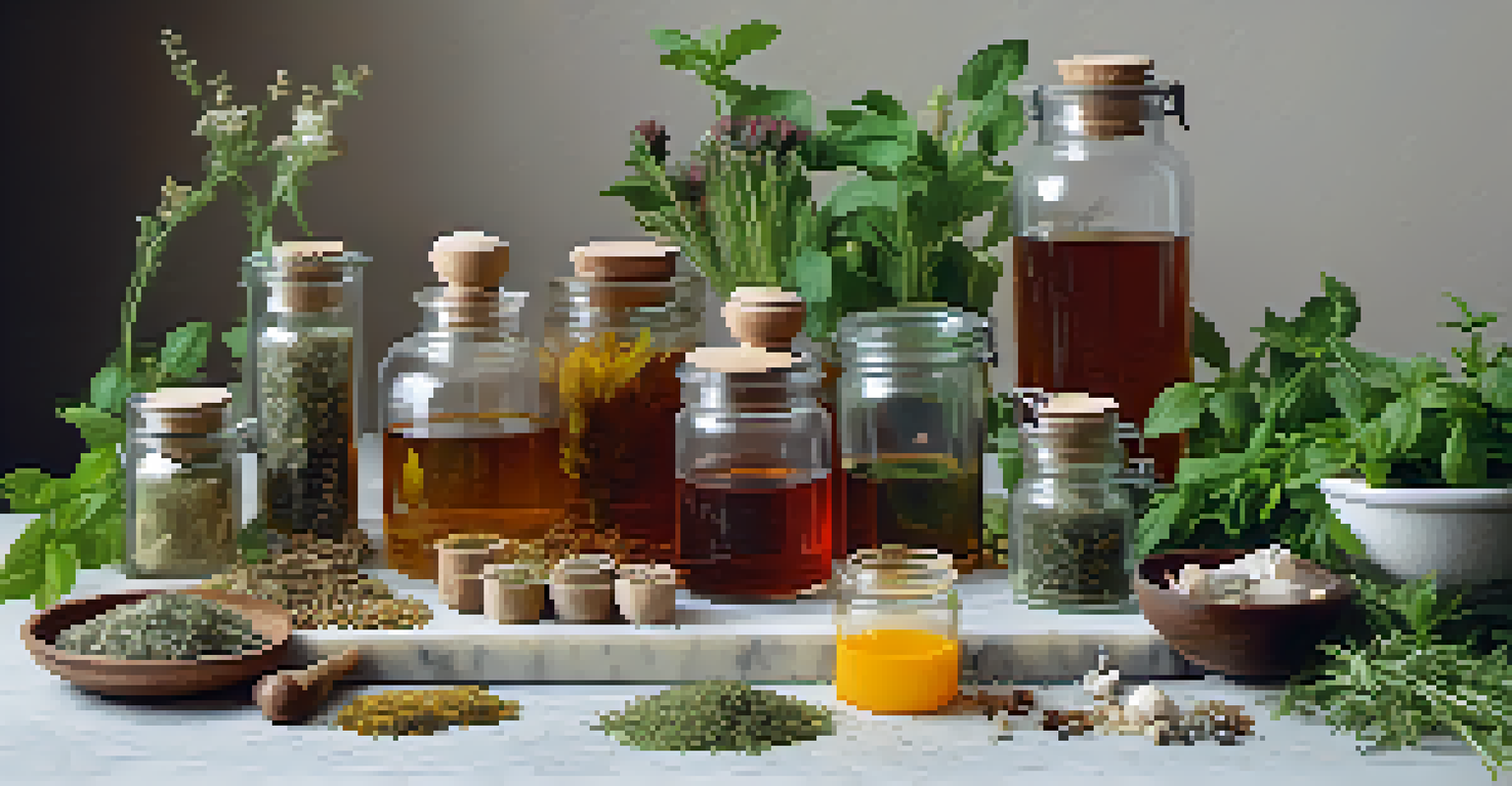The Role of Herbal Remedies in Holistic Health Practices

Understanding Holistic Health: A Comprehensive Approach
Holistic health is all about seeing the bigger picture when it comes to well-being. Instead of just treating symptoms, it focuses on the whole person—mind, body, and spirit. This approach recognizes that every aspect of our lives influences our health, from diet and exercise to emotional and spiritual well-being.
The greatest medicine of all is teaching people how not to need it.
In this interconnected framework, herbal remedies play a pivotal role. They are not merely supplements; they are integral components that help restore balance and enhance overall health. For instance, while some might turn to pharmaceuticals for stress relief, herbal options like chamomile or lavender can provide a gentle, natural alternative.
By incorporating herbal remedies into holistic practices, individuals can experience a more rounded approach to wellness. This synergy between nature and holistic health creates opportunities for deeper healing and personal empowerment.
Common Herbal Remedies and Their Benefits
Herbal remedies come in a variety of forms, such as teas, tinctures, and capsules, each offering unique benefits. For example, ginger is known for its anti-inflammatory properties and can aid in digestion, while echinacea is often used to bolster the immune system. These are just a few examples of the countless herbs available that can support our health in various ways.

Moreover, many people find that herbal remedies can complement their lifestyle seamlessly. They can be incorporated into daily routines, such as sipping herbal tea in the morning or adding fresh herbs to meals. This not only promotes health but also enhances the enjoyment of food and self-care rituals.
Holistic Health Emphasizes Balance
Holistic health focuses on treating the whole person—mind, body, and spirit—rather than just addressing symptoms.
Ultimately, the beauty of using herbal remedies lies in their diversity. There’s something for everyone, whether you’re looking for stress relief, digestive support, or immune enhancement. These natural options empower individuals to take charge of their health journey.
The Science Behind Herbal Remedies
While herbal remedies have been used for centuries, modern science is beginning to catch up in understanding their benefits. Research has shown that many herbs contain active compounds that contribute to their health-promoting properties. For instance, curcumin found in turmeric is praised for its anti-inflammatory effects, making it a popular choice for joint health.
Nature itself is the best physician.
However, it's essential to approach herbal remedies with an open yet critical mind. Not all herbs are created equal, and the effectiveness can vary based on factors like quality, dosage, and individual health conditions. Consulting with a healthcare professional knowledgeable in herbal medicine can help ensure safe and effective usage.
By bridging traditional knowledge with scientific research, we can better appreciate the value of herbal remedies in holistic health. This collaboration allows for informed choices and a more profound understanding of how these natural options can fit into our health strategies.
Integrating Herbal Remedies into Daily Life
Incorporating herbal remedies into your daily routine doesn't have to be complicated. Start small by introducing one or two herbs that resonate with your health goals. For example, if you're looking to improve sleep quality, consider drinking valerian root tea before bedtime or adding a few drops of lavender essential oil to your pillow.
Another effective method is to create herbal-infused oils or salves for topical use. These can be handy for soothing skin irritations or muscle soreness. It’s a fun and creative way to connect with nature while embracing the therapeutic properties of herbs.
Herbal Remedies Enhance Wellness
Incorporating herbal remedies provides natural support for various health concerns, promoting a more rounded approach to wellness.
As you explore different ways to integrate herbs into your life, pay attention to how your body responds. This personalized approach allows you to fine-tune your choices and discover which remedies truly enhance your well-being.
Safety Considerations When Using Herbal Remedies
While herbal remedies are generally considered safe, they can interact with medications and may not suit everyone. It’s crucial to do your research and consult with a healthcare provider, especially if you’re pregnant, nursing, or have existing health conditions. Understanding the potential side effects and contraindications ensures a safer experience.
Another important aspect is sourcing quality herbs. Always opt for products from reputable suppliers that provide clear information about their sourcing and manufacturing processes. This way, you can trust that you’re using high-quality herbs that have been properly tested.
Taking these precautions allows you to enjoy the benefits of herbal remedies while minimizing risks. With informed choices, you can confidently incorporate herbal options into your holistic health practices.
The Role of Herbal Remedies in Preventive Health
Herbal remedies are not just for addressing existing health issues; they also play a significant role in preventive health. Regular use of certain herbs can help fortify the body against illness. For instance, elderberry is renowned for its immune-boosting properties and can be a fantastic ally during flu season.
Incorporating herbal remedies as part of a balanced lifestyle promotes long-term health and resilience. This proactive approach encourages individuals to take control of their wellness, making herbal options a valuable addition to a preventive health strategy.
Safety and Quality Matter
It's essential to consult healthcare professionals and choose quality herbs to ensure safe and effective use of herbal remedies.
Ultimately, embracing herbal remedies can lead to a healthier and more vibrant life. By prioritizing prevention, we can enhance our overall well-being and cultivate a deeper connection to nature.
Conclusion: Embracing Herbal Remedies in Holistic Health
Herbal remedies offer a rich and diverse resource for those seeking to enhance their holistic health practices. By viewing health through a comprehensive lens, we can appreciate the value of these natural options in achieving balance and well-being. The journey into herbalism is also a personal exploration, allowing individuals to discover what resonates best with their unique health needs.
As more people turn to holistic approaches, the integration of herbal remedies will likely continue to grow. This shift reflects a broader desire for natural, sustainable solutions to health challenges faced in modern life. By embracing these practices, we can foster a greater sense of empowerment and connection to our health.

In conclusion, herbal remedies serve as a bridge between tradition and modern wellness practices. They not only support our physical health but also nurture our mental and emotional well-being, enriching our holistic health journey.